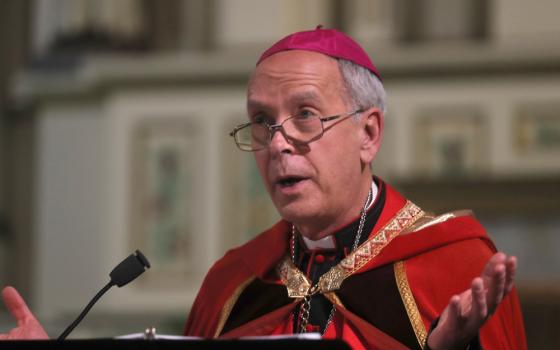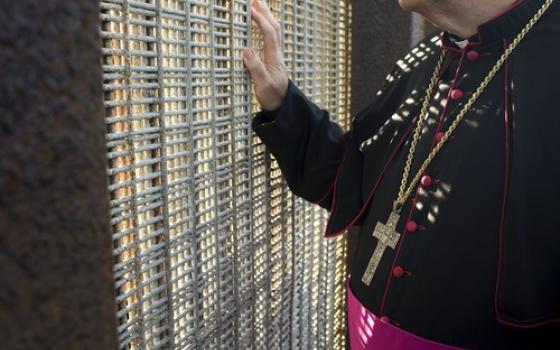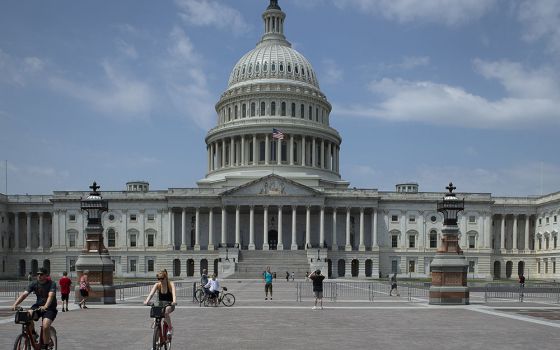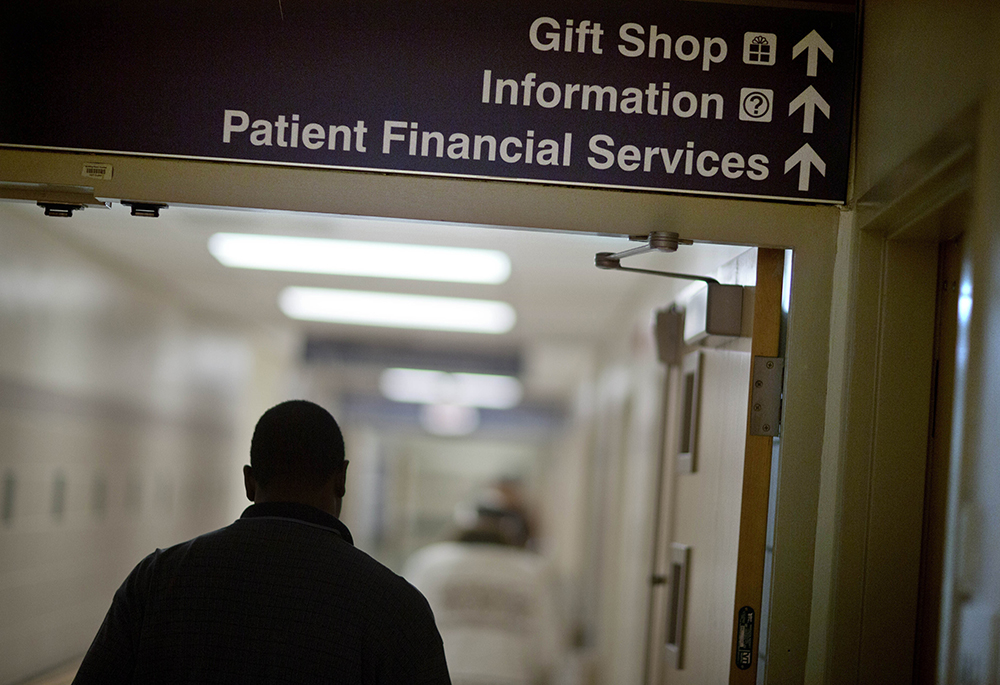
A sign points visitors toward the financial services department at a hospital in this file photo. The Catholic Health Association has issued a plea to congressional leadership asking them to reject funding cuts and structural changes to Medicaid. (AP photo/David Goldman, File)
Six years ago, Brittany quit using meth. Two years later, she gave birth to her first child. Now the 28-year-old and her husband have launched a business in their new community of Walla Walla, Washington. She cleans houses; he offers painting services.
"So much of all this was with a boost from Medicaid," said Brittany, whose recovery program and delivery were covered by the public health insurance program for low-income and disabled individuals. "Changes to it would be a big blow."
Republican legislators on Capitol Hill are eyeing Medicaid as they pursue funds for President Donald Trump's priorities — chiefly, tax cuts and crackdowns on immigration. In response, the Catholic Health Association, representing the largest group of nonprofit health care providers in the country, issued pleas to lawmakers, asking them to reject funding cuts and structural changes to Medicaid.
Association leaders say dramatic alterations to the program would harm poor and vulnerable populations, among them families like Brittany's (the National Catholic Reporter agreed to withhold her last name so as not to jeopardize her fledgling business).
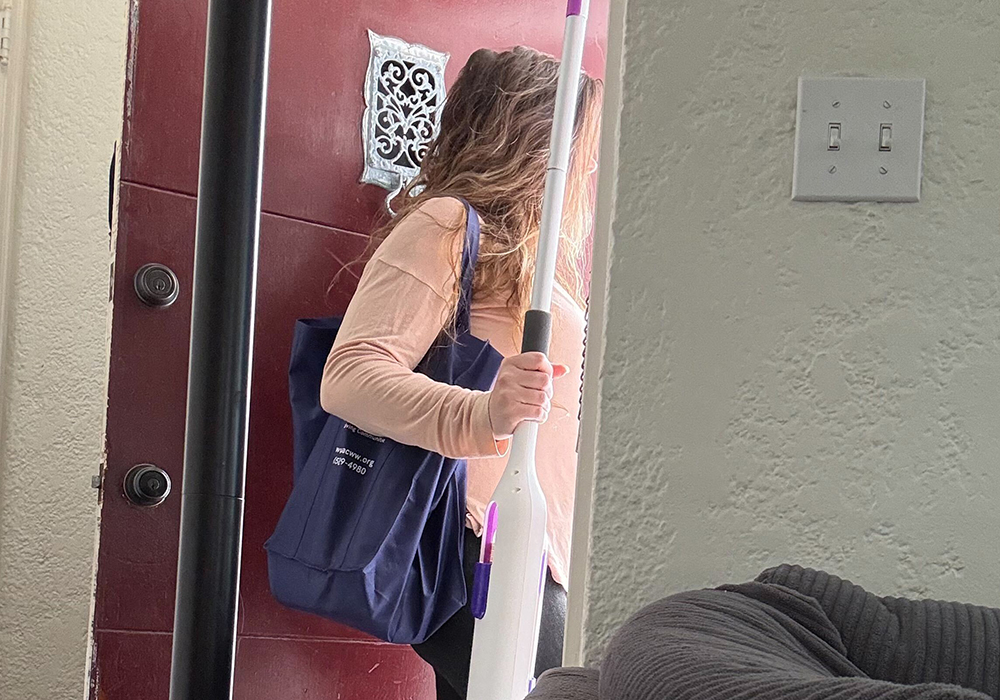
Medicaid helped cover an addiction recovery program for Brittany, who now has two young sons and launched a cleaning and painting business with her husband. "Having that ability to attend rehab, to be able to afford it, has been so valuable in my life," said Brittany, pictured heading to work in February. (Courtesy photo)
A budget resolution advanced by the House Budget Committee earlier this month lowers taxes, raises the debt limit by $4 trillion and seeks to reduce spending by at least $1.5 trillion. It tasks the Energy and Commerce Committee, overseeing Medicaid as well as climate and energy initiatives and other programs, with finding at least $880 billion in cuts, or more than half the overall reductions outlined. House members are slated to vote on the resolution next week.
On Feb. 18, the Senate agreed to proceed with its own, narrower budget resolution, which does not specify what cuts would be implemented to offset new funding for the military, deportations and changes to energy policy.
Republicans in Congress hope to agree on a budget outline soon in order to employ a special legislative tactic that can pass policy goals with a simple-majority vote, removing Senate Democrats' ability to block it with a filibuster. It is not yet clear what the ultimate cuts to Medicaid might be.
Mercy Sr. Mary Haddad, president and CEO of the Catholic Health Association, sent a letter on Feb. 20 to the House of Representatives urging members to cast a "no" vote on their budget resolution.
"These cuts would have devastating consequences, particularly for those in small towns and rural communities, where Medicaid is often the primary source of health care coverage," she said.
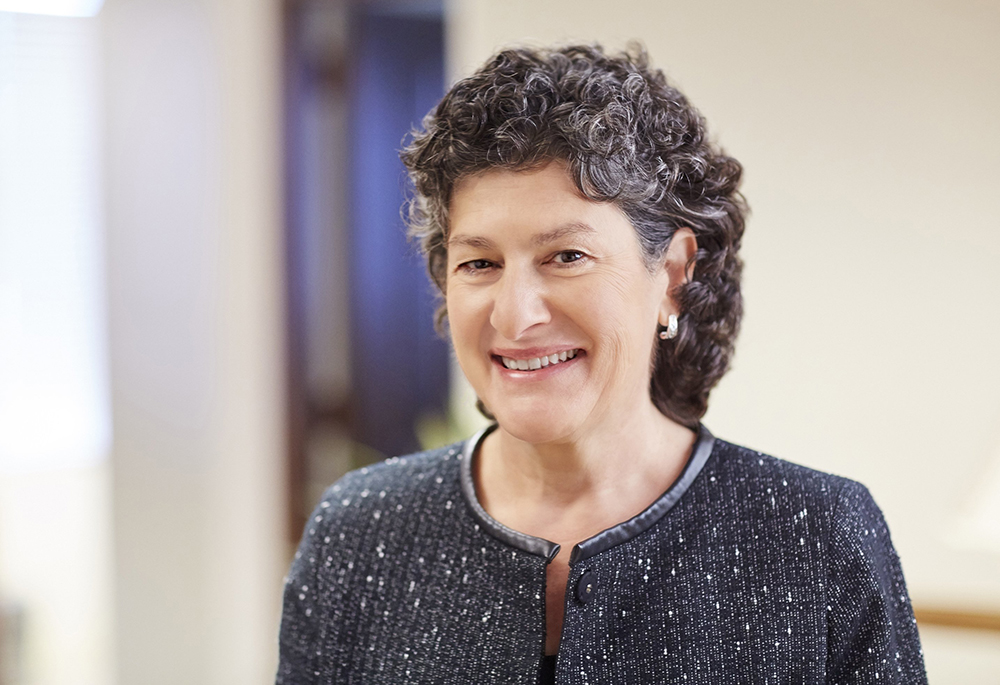
Mercy Sr. Mary Haddad, president and CEO of the Catholic Health Association, is pictured in this 2016 file photo. (CNS/Courtesy of CHA)
A few weeks ago Haddad wrote to congressional leaders, including House Speaker Mike Johnson and Senate Majority Leader John Thune, pressing them to protect and strengthen a number of federal health and safety net programs as they work out the budget.
Medicaid covers about 1 in 5 Americans and pays for more than 40% of all births in the country. Restructuring Medicaid "fundamentally undermines coverage" for children in poverty, the elderly, disabled individuals and pregnant women, said Haddad in her Feb. 3 letter.
It is not just a health program, she said, "it is a lifeline. It provides stability, dignity, and access for those who need it most."
Brittany's family relies on Medicaid for medical and dental care, and the program pays for their 4-year-old's intensive speech therapy.

Brittany, her husband and their two sons, pictured playing along the Animas River in Colorado, rely on Medicaid for a range of services, including medical and dental care and speech therapy for the 4-year-old. (Courtesy photo)
"It would be detrimental to our mental and physical health if some of these key things were not covered," she said. "It's hard to imagine."
After Brittany's husband lost his job due to illness, the family struggled to afford a home in Portland, Oregon, where there is a severe shortage of affordable housing. Poor credit made securing a house even more difficult. The young family spent time in a shelter and then an apartment complex where Brittany said a stabbing occurred near their unit.
"We are just getting started in Walla Walla, and we are really grateful for the help as we get on our feet," she said. "This is not our end point. We don't want all this to be permanent. But I'm fearful about what Medicaid cuts would mean for us right now."
Established nearly 60 years ago, in 1965, Medicaid was quickly embraced by Catholic health care leaders, who viewed it as aligned with Catholic social teaching.
"Creating barriers to accessing health care goes against that teaching," said Paulo Pontemayor, senior director of government relations at the Catholic Health Association.

"Access to health care really allows people to live with dignity," said Paulo Pontemayor, senior director of government relations at the Catholic Health Association, discussing possible cuts to Medicaid. (Courtesy of Paulo Pontemayor)
In addition to Haddad's letters — also calling for protection of the Supplemental Nutrition Assistance Program, or SNAP, likewise threatened in budget plans — the Catholic Health Association endorsed a Feb. 6 statement released by the Partnership for Medicaid, a nonpartisan, nationwide coalition aimed at preserving and improving the government-run insurance program.
The coalition includes the National Health Care for the Homeless Council, the Children's Hospital Association and the National Rural Health Association, as well as the Catholic Health Association.
State Medicaid programs are already stretched thin financially, reads the statement, and federal funding cuts would shift more of the program's costs onto state and local governments, providers, patients and local taxpayers who "would not be able to absorb them."
The statement says the consequences would also be: longer term and higher health care costs when conditions are not treated early; job losses, especially in rural areas where individuals are more likely to rely on Medicaid and health care providers serve as a major source of employment; and the closure of essential services.
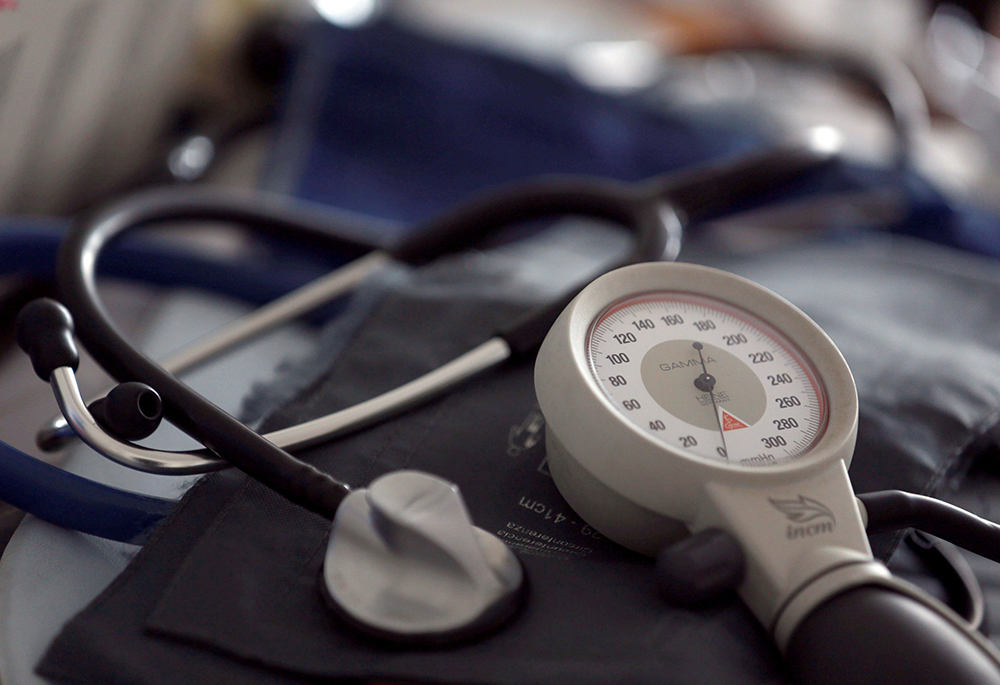
A stethoscope is seen in this illustration photo. (CNS/Reuters/Regis Duvignau)
Among the biggest changes to Medicaid being seriously considered by Republicans in Congress, according to Pontemayor, are work requirements, "per capita caps" and block grants. A per capita allotment caps the federal government's Medicare funding to states based on enrollment numbers, not on enrollees' health care costs. The change could free up an estimated $900 million over a decade.
Block grants are similar to per capita caps and impose an overall cap on federal funds to state Medicaid programs.
There already is evidence of block grants' limitations, said Pontemayor. The American territory of Puerto Rico receives block grants, and their health care infrastructure faces many challenges, including providers leaving the island, he said.
An analysis by the Commonwealth Fund, a nonprofit research group, says Puerto Rico's experience suggests capped federal Medicaid funding could shift large costs to states and lead to cuts in benefits, provider payments and eligibility.
Johnson, the House speaker, and other Republicans have described work requirements as a common-sense idea. Estimated savings are around $100 billion, according to Pontemayor.
Yet such requirements have not been effective in the two states that have tried them, Pontemayor said. In Arkansas, where work requirements temporarily were included in Medicaid, the uninsured rate increased by 7% in 10 months, wrote Haddad.

U.S. House Speaker Mike Johnson, R-La., listens to the national anthem during a ceremony in Washington on Dec. 10, 2024. (OSV News/Reuters/Tierney Cross)
Those who lost coverage in Arkansas said they were forced to delay care or skip medications due to cost, or they incurred sizable medical debt, according to one analysis. Most significantly, the employment rate for the target population did not increase.
Work requirements create barriers and loss of coverage "while at the same time doing little to promote and support gainful employment," Haddad said.
Pontemayor added that the requirement would put a lot of pressure on states, "who are very underresourced," to be enforcers of the program. And he noted that most adults under 65 on Medicaid have jobs or are unable to work because they are caring for another person, among other reasons.
Patients, providers and advocates have criticized Catholic hospitals in recent years for treating fewer Medicaid patients than other nonprofit health care facilities. In response to the critique, Pontemayor told NCR that Catholic hospitals serve large populations in states that have not yet expanded Medicaid, and some of its members are the biggest providers of Medicaid in their region.
Advertisement
The Catholic Health Association's longtime support for Medicaid arguably reached its zenith as Sr. Carol Keehan, a Daughter of Charity and then CEO of the Catholic Health Association, worked closely with the Obama administration on the Affordable Care Act. She provided a key endorsement of the legislation that expanded access to more than 21 million people — a move that drew praise from Pope Francis and ire from U.S. bishops who opposed the law due to concerns about abortion funding and contraception requirements.
Members of the Republican Party have different views about what is prudent and possible when it comes to cuts in the years ahead. Pontemayor said lawmakers know well that many constituents, both health care providers and individuals, depend on the program. Republicans may have lost the House majority in 2018 following their attempts to revamp Medicaid and repeal Obamacare.
Trump, meanwhile, has said he will "love and cherish" Medicaid, while also saying he would endorse changes if waste or abuse were found, reported Politico. "It will only be more effective and better," said the president.
The Partnership for Medicaid statement says the coalition wants to work with policymakers to identify "sustainable strategies to strengthen Medicaid," and the Catholic Health Association supports bipartisan efforts to improve Medicaid without drastic cuts, said Pontemayor.
"But we have huge concerns with the radical kind of transformation of Medicaid being talked about right now," he said. "We are very concerned about the lives it would harm."
"By protecting our most vulnerable," said Haddad in her Feb. 20 letter, "we create a healthier, stronger society for everyone."





